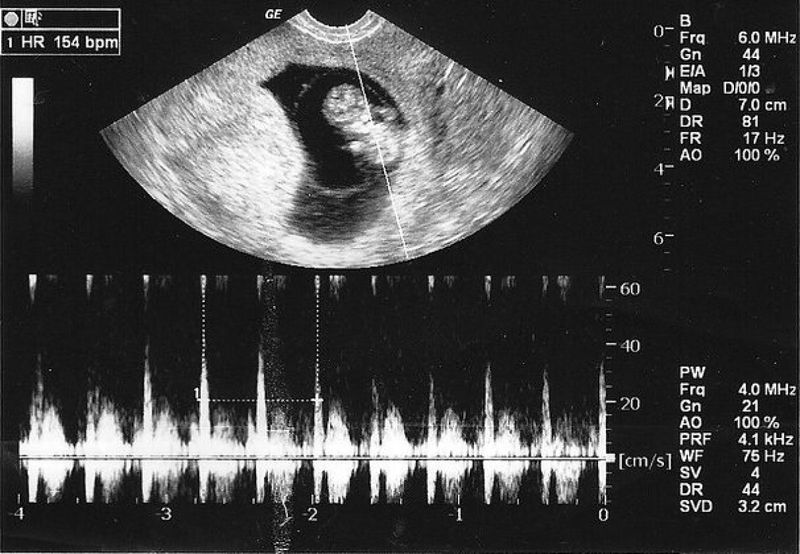An ultrasound is an imaging procedure using high frequency sound waves to allow you and medical professionals to get a better understanding of what is going on with your body. It doesn’t just confirm a viable pregnancy and detect a fetal heartbeat, but additionally, can detect potential pregnancy risks through comprehensive assessment by an experienced medical professional.
What types of risks can be detected?
A miscarriage is a spontaneous loss of a pregnancy before the 20th week. Approximately, 10-20% of pregnancies end in miscarriage and an even higher percentage of miscarriages occur before a woman even knows she is pregnant. According to the United States CDC, 1,118,000 out of 6,578,000 total pregnancies end in miscarriage with 80% of those occurring in the first trimester.
During an ultrasound appointment, an experienced registered nurse sonographer will perform a assessment including a total health history, vital signs, and pain assessment to detect abnormal cramping in your pelvic area or back, fluid or clots actively passing through your vagina or spotting.
Often, miscarriages are silent. If none of these signs and symptoms are present, the registered nurse sonographer can proceed with the ultrasound. If the ultrasound demonstrates inability to detect a baby’s heartbeat after six or more weeks of life, miscarriage precautions will be given and the patient will be immediately referred to a higher level of OBGYN care or emergency services. Through early detection and intervention made possible by the ultrasound and comprehensive health assessment, life-threatening conditions can be assessed and addressed immediately.
An ectopic pregnancy is one that is growing in the wrong place. A normal baby grows inside the uterus or womb, but in an ectopic pregnancy, the baby can be in the fallopian tube, ovary, cervix or abdominal cavity. Ectopic pregnancies account for 1-2% of pregnancies and is the most common cause of pregnancy-related deaths in the first trimester.
During an ultrasound appointment, the registered nurse sonographer will assess the patient for severe pain, specifically centered on one side of the abdomen or pelvis, lightheadedness, dizziness, blackouts, abnormally low blood pressure, passage of tissue from the vagina or bleeding from the vagina that may or may not be active.
If the patient reports these symptoms during the health assessment or if the patient has a positive pregnancy test without a gestational sac on ultrasound, the patient will receive ectopic precautions and be referred to urgent care for immediate medical attention.
Case Study #1
A patient came into TCMC to confirm a pregnancy. The patient had a positive pregnancy test, met all requirements for an ultrasound including no pain greater than menstrual cramps or level 6, no active bleeding or spotting, no history of ectopic pregnancy or IUD in place. During the ultrasound, the sonographer was not able to see what she expected to see, gave the patient miscarriage and ectopic precautions, and instructed the patient to report to the urgent care, especially if she experienced severe pain, cramping or bleeding. Four hours after the exam, the patient started experience pain and cramping, remembered what the sonographer instructed her to do, and immediately went to the emergency room. A second ultrasound was done under a high-level OBGYN. The patient was found to have internal bleeding and went straight to emergency surgery. When following up with the patient, the patient was grateful that she came to TCMC after being denied an ultrasound at another clinic. Her condition was life-threatening and because of early detection through comprehensive assessment and ultrasound, received the immediate care she needed.
Case Study #2
Another patient came to TCMC after seeking medical services after not having the financial means or transportation to get to clinic near her home. During an ultrasound, the sonographer did not see what she expected to see in that there was not a pregnancy in the uterus. The patient was given ectopic precautions and an UBER was ordered to transport her to the emergency room, as this patient had no transportation. In the emergency room, the ultrasound determined an ectopic pregnancy and the patient went into emergency surgery. When following up with the patient, she reported that if she had gone to any other clinic where they did not perform a comprehensive health assessment, this life-threatening condition would not have been detected.
Missed ectopic pregnancy is a leading cause of emergency medicine malpractice claims. At True Choice Medical Clinics, we prioritize a comprehensive health assessment, which includes the ultrasound to not only give the patient all the information to make informed decisions, but to aid in early detection of medical emergencies. We understand the integral part this plays in patient outcomes.




